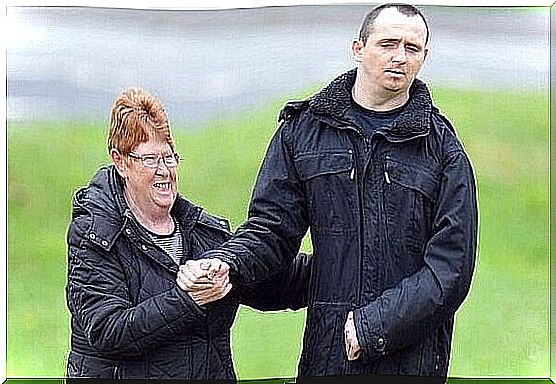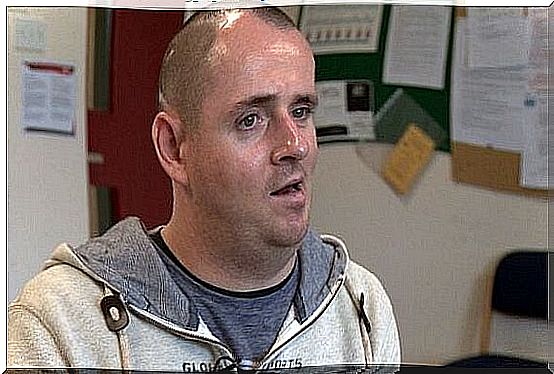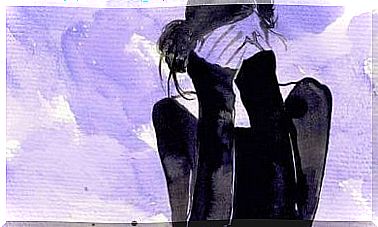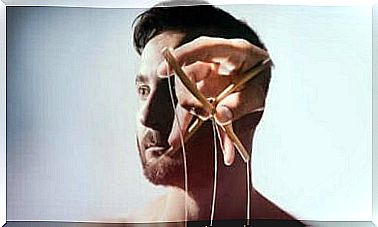Paul Pugh: A Case Of Pathological Laughter

Paul Pugh is a Welsh man who one night was brutally attacked by strangers. One of them hit him very hard in the head. After a while, Paul developed an unpleasant symptom: pathological laughter, a kind of brain failure.
Pathological laughter is laughter you can not contain, and it has nothing to do with the situation it happens in. On paper, it may sound funny, but it is actually a very serious condition. The condition has a few different names, and the most technical is “elastic epilepsy”. Some of its other names are “pseudobulbar influence” and “emotional incontinence”. In fact, it was Paul Pugh’s case that popularized the concept of pathological laughter.

The Paul Pugh case
The Paul Pugh case is one of the most famous. His tragic story began one night in 2007 when he went out with friends. On the way home, he met four men who started beating him for no reason.
The blows were so powerful that they ruptured his skull. Paul, who was 27 at the time, was put in a coma for two months. He had to learn to do even the simplest tasks again: walk, eat, talk, etc. But when it seemed as if he had finally recovered from it all, then something strange happened.
He went to a meeting with his doctors where they began to tell him about the consequences of the assault. This meeting had a terrible effect on Paul. He felt a very strong urge to cry, and he actually did this in his mind and heart. But on the outside, all he could do was laugh. He had pathological laughter. He cried on the inside, but laughed on the outside.
At first it meant only one thing to him, social rejection. After a while, the doctors finally realized what was going on. They called it “pseudobulbar influence” (PBA), which meant that there was a disconnection in the brain.
Someone with this problem may start having episodes of pathological laughter (or crying). Years later, Paul has learned to control 9 out of every 10th episode.

Pathological laughter and what causes it
Pathological laughter can be very troublesome for those who have it. They also tend to isolate themselves because of their “inappropriate” behavior. Many people talk about how awful it is to feel an intense feeling, but express another feeling that has nothing to do with what they actually feel.
Pathological laughter and crying occur for many different reasons. It usually comes after some kind of trauma, as in Paul’s case. But there are some abnormal neurological conditions that can also cause it.
There are cases of people with multiple sclerosis (MS) with these symptoms. There have also been cases of pathological laughter in people with Alzheimer’s. It seems that any condition that directly affects your brain can lead to pathological laughter.
Brain tumor is another possible cause. As far as we can tell, this is due to a disconnection between the brain, cerebellum and medulla oblongata. We also know that the hypothalamus plays a role in the condition.

Other types of pathological laughter
There are also psychiatric cases of psychological laughter for various reasons. This is where the general term “emotional incontinence” applies. It has to do with mental relationships where a person’s emotions are expressed in an exaggerated way. They cannot hold back laughter, tears or other emotions. Dementia from vascular problems is also associated.
Even some types of schizophrenia can cause pathological laughter episodes. It can also happen as a result of taking psychoactive drugs: It is common knowledge that marijuana use makes many people uncontrolled. Even some conditions on the autism spectrum include it as a symptom.
The saddest part of it all is that people with this problem usually have other side effects as well. According to a study conducted by the Department of Psychology at the University of Freiburg (Germany), more than half of people with this condition show other symptoms on top of those we have talked about. They usually suffer from a reduction in IQ along with other cognitive problems.
There are not many treatment options for pathological laughter. In short, it is no cure. But people like Paul Pugh are inspiring examples; he has managed to discover the moment just before a pathological laughter episode. He immediately thinks of unpleasant pictures, which makes him laugh. Unfortunately, however, this condition still affects his life.









